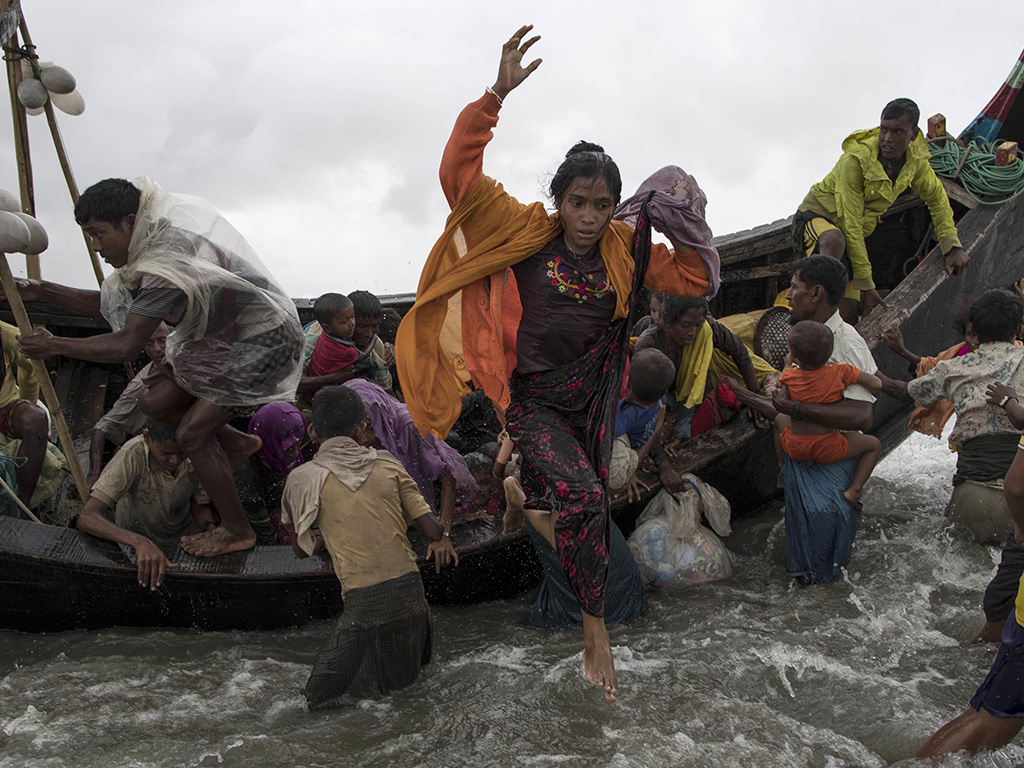The ongoing violence in Myanmar’s Rakhine State has produced an estimated 412,000 Rohingya refugees who have arrived in Bangladesh since 25 August 2017, making this the fastest growing refugee crisis of recent years. The emergency is characterized by enormous and acute humanitarian needs in a country that is already hosting an estimated 350,000 Rohingya refugees. Source UNHCR sept 20th 2017
The Bangladesh government’s Department of Disaster Management (DDM) under the Disaster and Relief Ministry is actively working to respond to the crisis. Part of the response includes plans to construct a large camp to house some 400,000 Rohingya Muslims, officials said.
Developing the skills required to work in a conflict situation is a new experience in Bangladesh, a country which is more commonly affected by natural disasters. So in order to support Bangladesh’s response, the DDM is calling on support from partners including graduates of the Humanitarian Trainee Scheme (HTS), a capacity-building programme run by Save the Children, and funded by UK Aid through the Disasters and Emergencies Preparedness Programme.
The Bangladesh DDM is a key collaborating partner of the entry-level Humanitarian Trainee Scheme (HTS), which is one of several humanitarian capacity-building programmes run under the Talent Development Project. The HTS brings talented and committed young people into the humanitarian sector, providing them with a comprehensive and structured year-long apprenticeship which prepares them for future careers as humanitarian aid workers.
HTS trainees undergo a 6-month training programme including two residential workshops, distance learning, written assignments accredited at Master’s level by Oxford Brookes University, mentoring and coaching. This is completed alongside a 12-month work placement with a national or international humanitarian organization, including field experience.
Three HTS trainees have been placed in the Department of Disaster Management, and recounted positive learning experiences and supportive line-management. In turn, the DDM highly acclaimed the work of the HTS programme in building the necessary humanitarian skills, knowledge and behaviors to work with disaster-affected people, not only in natural disasters but also in conflict zones.
Due to the success of the partnership, Mr Eftekhar Islam, Director Relief of DDM, called Mrs Shahana Hayat, HTS Programme Manager at Save the Children Bangladesh, on 18th September to discuss the possible deployment of HTS graduates to work with local government in the crisis response at Cox’s Bazar. 10 graduates from the Talent Development Project, including eight entry-level HTS graduates, were chosen.
The deployment plan, including the approval of each individual graduate and the potential roles they will play, was developed and approved by the Bangladesh government in just 24 hours. At the UK end, Save the Children UK, the Start Network and DFID also agreed within 24 hours to pay the travel, food and accommodation costs of the deployment under the Talent Development Project budget.
As a result a group of 10 Talent Development Project graduates will be deployed at the refugee crisis area, initially from 24th September to 9th October. The ten will include 8 graduates of the entry-level HTS programme, plus two other existing humanitarian staff members who have graduated from Talent Development’s mid-level and leadership-level training programmes.
The Bangladesh government has currently suggested two possible areas for the engagement of the ten graduates:
- Opportunity one: to work with the Home Ministry’s Public Security Division, to extensively monitor the overall situation and law and order in the border areas of Cox’s Bazar districts, supporting needs assessment and collaboration activities
- Opportunity two : to work with the cyclone preparedness centre to erect 400 tents for Rohingya people
The deployment process will be documented by the DEPP (Disasters and Emergencies Preparedness Programme) Learning Team and stories from the deployed Talent Development graduates will be collected, to capture the outcome and potential added-value of the deployed Talent Development graduates.
The commitments and support from the Bangladesh DDM to the Humanitarian Trainee Scheme to date include: providing physical space and logistics to host programme meetings and workshops; allocating work placements for HTS trainees and supportive Line Management; and, enable participation of DDM staff HTS trainees within their DDM staff role responsibilities. The Assistant Director personally served as Line Manager and mentor to five HTS trainees successfully placed in DDM during the second cohort.
Read more about the Disasters and Emergencies Preparedness Programme.

